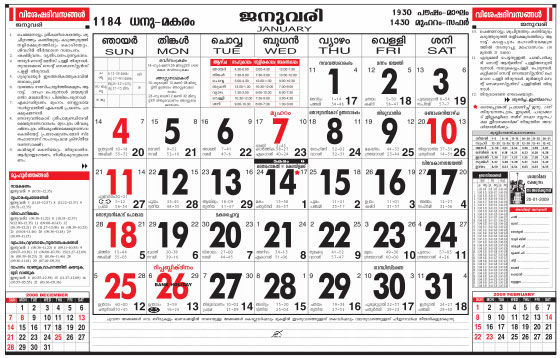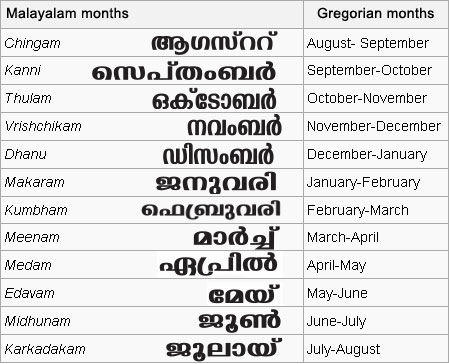Malayalam calendar (or Malayalam Era or Kollavarsham) is a solar Sidereal calendar used in the state of Kerala in South India. The era started in the year 825 AD.Origin. Most of the regions in Kerala used Kali abda before the acceptance of Kollavarsham.
The origin of Kollam Era or Kollavarsham is a subject of contention amongst the scholars. The two most common are the birth of the great philosopher Adi Sankara whose birth has been dated as being 825 A.D. and the other being the great convention in Kollam at the behest of Mahraja Udaya Marthanda Varma. Some scholars including Hermann Gundert believe that this conference was called for the consecration of a Shiva temple. There are some alternate theories such as one attributed to Nestorian Christian merchants who settled in KorukeNi kollam, however these theories have been discredited by mainstream scholars for lack of any evidence.

New Year and Vishu
Although the start of a new year in the Kollavarsham system (ആണ്ടുപിറപ്പ്) is on the first day of the month of Chingam (mid-August), the beginning of the astronomical year (solar calendar) takes precedence. This falls on the day of vernal equinox in the month of Medam (mid-April) and is celebrated as Vishu. Vishu coincides with new year festivities elsewhere in India, such as Bihu (Assam) and Baisakhi (Punjab).
Months
The months are named after the constellations through which the Sun. Thus Chingam (from Simham or Lion) is named after the constellation Leo and so on.

Days
The days of the week in the Malayalam calendar are suffixed with Azhcha (ആഴ്ച - week).
- njayar (sunday) : ഞായര്
- thinkal (monday) : തിങ്കള്
- chouwa (tuesday) : ചൊവ്വ
- budhan (wednesday) : ബുധന്
- vyazham (thursday) : വ്യാഴം
- velli (friday) : വെള്ളി
- shani (saturday) : ശനി
Just like the months, there are twenty seven stars starting from Aswathi (Ashvinī in Sanskrit) and ending in Revatī. The 365 days of the year are divided into groups of fourteen days called Njattuvela, each one bearing the name of a star.
Significant dates
The festivals Andupirapp (ആണ്ടുപിറപ്പ് - new year), celebrated on the 1st of Chingam, Vishu (വിഷു - astronomical new year), celebrated on the 1st of Medam and Onam (ഓണം), celebrated on the star tiruʋoːɳəm in the month of Chingam, are three of the major festivals.
The Makaravilakku festival is celebrated in the Ayyappa Temple at Sabarimala on the 1st day of month Makaram. This marks the grand finale of the two-month period to the Sabarimala pilgrimage.
Derived names
Many events in Kerala are related to the dates in the Malayalam calendar. The agricultural activities of Kerala are centred around the seasons. The Southwest monsoon which starts around June 1 is known as Edavappathi, meaning mid-Edavam. The North east monsoon which starts during mid October is called thulavarsham (rain in the month of thulam). The two harvests of paddy are called Kannikkoythu and Makarakkoythu (harvests in the months kanni and makaram) respectively.
